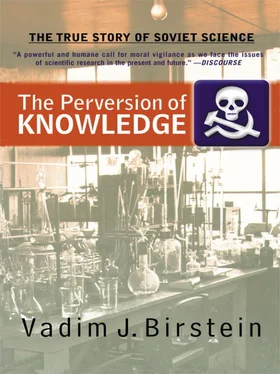Later, on June 21, 1941, NKGB investigator A. Koshelev and deputy head of the First Division of the NKGB Investigation Department, Lieutenant Aleksandr Khvat, issued an order to destroy twenty-six of the listed items. They included ninety-two folders of Vavilov’s materials about expeditions and trips to Africa, the United States, and England; ninety notebooks; eight folders of Vavilov’s unpublished manuscripts “in Russian and foreign languages”; numerous photos brought by Vavilov from expeditions; nine folders of Vavilov’s letters; two folders of letters to Vavilov; 157 professional books; 123 issues of professional journals; four books written by Bukharin; a book of memoirs by the Russian anarchist Pyotr Kropotkin; and a photo of the head of the Russian Provisional Government, Aleksandr Kerensky; among other things. According to the opinion of the investigators, only four professional books were to be saved, to be given to the VASKhNIL library. The NKGB acquired two items: two rifle cartridges and “an old flint-lock gun decorated with a plaque made of white metal,” that is, an antique pistol. Deputy head of the NKGB Investigation Department Major Lev Schwartzman 93approved this order on June 29, 1941. 94Vavilov’s scientific legacy disappeared into the NKGB furnaces.
On August 10, 1940, head of the Third Economic Department of the Leningrad Region NKVD Branch Zakharov and head of the Fourth Division of this department, N. Makeev, signed a long top-secret document called the Memorandum. 95It described the main accusations listed in the warrant in detail. Vavilov’s alleged “anti-Soviet group” supposedly consisted of twenty-four members of the VIR staff. Five persons from this list (the botanists Leonid Govorov, Konstantin Flyaksberger, and Aleksandr Maltsev, and the geneticists Georgii Karpechenko 96and Grigory Levitsky 97) were arrested later, in 1941. This group was supposedly a remnant of the TKP and other anti-Soviet organizations.
The document stated that “the anti-Soviet activity of VAVILOV connects him with the interests of capitalistic states: England, USA, Germany.” Among these “hostile” connections, the Memorandum declared: “It is known that Vavilov had many meetings with the German General Consul Zechlin which took place in the private apartment of a member of the group, Emme. According to known information, Zechlin was interested in all problems of economy and agriculture…” 98
Later, Zechlin’s name surfaced during many interrogations of Vavilov. 99As proof of the accusations of anti-Soviet activity and “wrecking,” the Memorandum cited long excerpts from “testimonies of scientists arrested and tried between 1932–38.” The end of the Memorandum is the most interesting: It consists of citations of Vavilov’s statements against Lysenko, evidently collected by NKVD informers. The last citation says: “LYSENKO himself is weak, but there is support of the Party and government leaders behind him, which guarantees him the victory in the fight against the truth in science…. We were, are and will be the ‘anti’ [i.e., anti-Lysenkoists]; we will go to the fire for our [scientific] views and will not surrender our positions to anybody. It is not possible to give up the position. One must fight to the end.’” Definitely, the last two sentences impressed the NKVD officers: They cited them in two documents. An independent professional opinion about a Party-supported colleague was considered to be a serious offense against the state.
The reaction of Academician Dmitrii Pryanishnikov, who in 1940 was already seventy-five years old, to Vavilov’s arrest was the most courageous. 100From the spring of 1941 until the end of 1943, he unsuccessfully fought in defense of his best pupil, Vavilov. In February 1941, Pryanishnikov did what was considered impossible—he had an appointment with State Security Commissar Lavrentii Beria at the NKVD headquarters at Dzerzhinsky (Lubyanka) Square and tried to defend Vavilov. 101After this meeting, he found out that not only Vavilov but two other talented plant geneticists, Georgii Karpechenko and Leonid Govorov, had also been arrested by the NKVD. Pryanishnikov immediately wrote letters to Beria and to the president of the Academy, the botanist Vladimir Komarov.
In the letter to Beria, Pryanishnikov openly criticized Lysenko and his followers and the slander they had spread, which led to the NKVD actions. 102He even described the behavior of an NKVD informant, the botanist Shlykov, who had denounced Vavilov in a secret letter to the NKVD:
One can conclude that Vavilov’s enemies consider that his scientific disagreements with Lysenko caused Vavilov’s arrest from the fact that Shlykov (an employee at the VIR who had been accepted on Lysenko’s demand against Vavilov’s will) boasted that he “forced Vavilov to be arrested.” He repeatedly said that he wrote secret information on Vavilov [to the NKVD] and that he was proud of this action. 103
In fact, Shlykov informed on Vavilov to the NKVD at least twice. 104And on March 2, 1939, he wrote to the Central Committee Science Department. 105Shlykov proposed to replace Vavilov as director of the VIR with the NKVD agent Shundenko, who was already deputy director despite his professional incompetence.
Pryanishnikov started his fight to save Vavilov during a very difficult time—the autumn of 1940 through the spring of 1941. On August 10, 1940, Vavilov was brought to the dreaded Lubyanka Prison in Moscow. 106At 1:30 P.M. on August 12, 1940, the deputy head of the GEU Investigation Department, the ruthless interrogator Aleksandr Khvat, started his first interrogation of Vavilov, which went on for five hours. 107Vavilov was in the hands of this sadist until the end of the “investigation.” Two long interrogations, on August 13 and 14, were held at night. 108On August 16, 1940, Vavilov signed a document stating that he was accused of conducting crimes according to Paragraph 58-1a (treason against the Motherland), 58-7 (wrecking in the interest of former owners or foreign countries), 58-9 (destroying state property for a counterrevolutionary purpose), and 58-11 (membership in a counterrevolutionary organization) of the Russian Criminal Code. 109The document was prepared and signed by Khvat and approved by the acting head of the GEU Investigation Department, Lev Schwartzman. 110
In a period of six months, due to the efforts of Khvat and another investigator, Albogachiev, Vavilov had changed from a strong fifty-three-year-old into a doddering old man. According to KGB (FSB) archival documents, from August 10, 1940, until June 14, 1941, Khvat interrogated Vavilov approximately 215 times, Albogachiev interrogated him thirteen times, and Schwartzman (who approved the destruction of Vavilov’s manuscripts and library) interrogated him twice. 111Schwartzman specialized in writing false transcripts of interrogations and usually worked in a pair with another ruthless investigator who tortured the interrogated person until he or she would sign materials prepared by Schwartzman. On the whole, Vavilov was interrogated by the NKVD investigators for approximately 900 hours. Some of the interrogations lasted twelve to thirteen hours.
For a better understanding of the NKVD/NKGB involvement in Vavilov’s fate, it is necessary to mention that from 1939–1943, the NKVD/NKGB structure had changed several times. 112From December 1938 and until February 1941, there were three Investigation Departments within the NKVD (under Commissar Beria) in the GUGB, GEU, and GTU (Main Directorate of Transportation). The Vavilov case was started by the GEU (head, Bogdan Kobulov; head of the Investigation Department, Pavel Meshik). Schwartzman was first deputy head of the GEU Investigation Department, Khvat was deputy head, and Albogachiev was senior investigator.
In February 1941, the NKVD was divided into two organizations: the NKVD (under Commissar Beria), without the Investigation Department, and the NKGB (under Commissar Vsevolod Merkulov), which included the Investigation Directorate headed by Lev Vlodzimersky. This structure existed until July 20, 1941, when the NKVD and NKGB were merged once again, into the NKVD (Commissar Beria, First Deputy Commissar Merkulov). Therefore, from February until Vavilov’s trial, the NKGB Investigation Department, headed by Vlodzimersky, with Schwartzman as his deputy and later acting head, was in charge of the Vavilov case. In March 1941, Khvat became deputy head of the First Department of the NKGB Investigation Directorate. His documents were approved by the head of the First Department of the NKGB Investigation Directorate, A. Zimenkov (i.e., Khvat’s direct superior), by the head of the NKGB Investigation Directorate, Vlodzimersky, and by the deputy NKG commissar, Kobulov. Prosecutor Bochkov and Military Prosecutor Vasiliev also signed decisions to continue the investigation. 113Vavilov’s verdict was signed by Khvat, approved by Schwartzman, Vlodzimersky, and first deputy NKGB commissar Ivan Serov. Besides these persons, investigators of the Fourth Division of the First Department of the NKGB Investigation Directorate, D. Konoplev and Kopylov, and Shukshin, the senior investigator of the same division, signed minutes of confrontations of Vavilov with the arrested Govorov, Panshin, Karpechenko, and Zaporozhets. 114
Читать дальше











